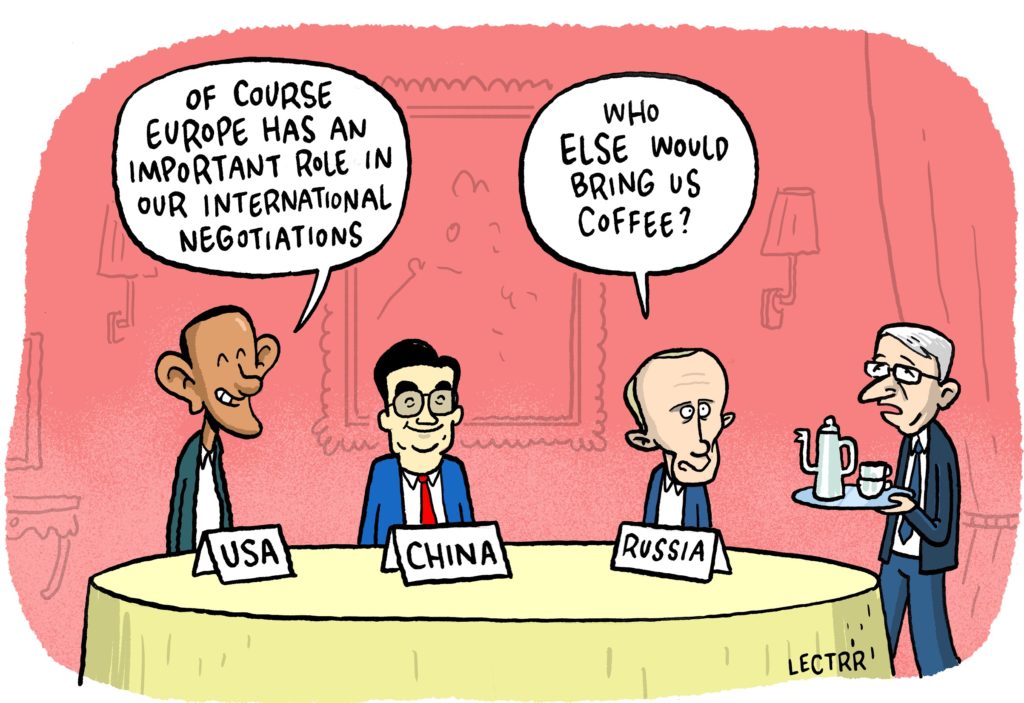Officials in Brussels have long looked forward to the United States’ decline. In a multipolar world with several great powers instead of a single superpower, Europe would escape from America’s shadow, they fantasised, and become a bigger global player again. But the European Union’s decline in recent years has been so dramatic that their dream looks like a delusion. In the emerging new world order, Europe looks set to matter much less, not more. The EU seems incapable of defending its interests on its own doorstep, let alone rivalling the US and China on the global stage.
Eight years into the crisis, with no end to the misery in sight, it is not just ordinary Europeans who have suffered; so too has the EU’s global standing. In 2007, the EU accounted for 31 per cent of the world economy, measured at market prices. This year, it will account for only 22 per cent, according to the International Monetary Fund (IMF). Eight years ago, the EU’s economy was a fifth bigger than the US’s; this year it is set to be smaller than America’s. Adjusted for differences in purchasing power – a euro stretches much further in a poor country than in a rich one – the EU now accounts for only a sixth of the global economy. China is set to overtake it this year. And all those economic statistics exaggerate the EU’s global heft. While the EU sometimes acts together, notably in trade negotiations, it still consists of 28 individual states with often differing agendas.
Continued economic decline seems inevitable. Granted, such projections are highly uncertain. Back in 2007, nobody was predicting that Europe would be as economically diminished as it is now. But while resolving the crisis in the eurozone, getting many more people into work and implementing radical reforms to boost investment and productivity would make a big difference to Europeans’ living standards, they would likely only slow Europe’s global decline, not halt it. In a world with 7 billion people (and rising), a small, greying continent with a stagnant (and soon-to-be falling) population of half a billion seems destined to relative decline, as poorer economies deploy foreign know-how and capital to catch up with richer ones.
Europe already matters much less in the world. In Brussels, the trans-Atlantic trade and investment negotiations with the US are a top priority for both policymakers and TTIP’s increasingly vocal critics. But in Washington, the focus is on the TPP negotiations with eleven dynamic economies in the Pacific. Countries in Africa, Asia and the Americas that were once drawn to Europe as their biggest export market now look to China instead. While Europe is still an attractive refuge for desperate people fleeing the arc of instability to its south and east, it is less appealing for many talented migrants – and Europeans – who see brighter opportunities elsewhere.
Europe’s decline is political as well as economic. The EU has an exceptional ability to transform its neighbours for the better – and thus enhance its own prosperity and security. The prospect and then the reality of EU membership has helped spread prosperity and entrench democracy and the rule of law, first southwards (to post-fascist Greece, Spain and Portugal) then eastwards (to 11 former communist countries). Contrast Poland’s experience with Ukraine’s. At the fall of communism, Poland was as poor as Ukraine, its democracy fragile, its future uncertain. Twenty-five years later, it is three times richer than Ukraine, and much more stable and democratic than its eastern neighbour. Undeniably, the EU has made a huge difference.
The EU has not lost its allure for its increasingly troubled neighbourhood. On the contrary, fearful of Vladimir Putin’s aggressively expansionist Russia, many countries are keener than ever to join. But, regrettably, the door is now slammed shut. Exhausted by the crisis, a weak and divided EU is turning inwards. European Commission President Jean-Claude Juncker insists that no new members will be admitted during his tenure (initially until 2019). What message does that send to reformers in candidate countries such as Serbia, at a time when Putin is trying to woo the Balkans back into Moscow’s orbit? One long-time candidate, Turkey, is already losing interest in joining.
The EU refuses to offer even the possibility of eventual membership to countries in its “Eastern Partnership”. Have blinkered officials learned nothing from Ukraine’s Orange Revolution a decade ago, when the then Commission president dashed Ukrainians’ hopes by telling them there was no prospect of ever joining the EU?
Far from looking to expand, the EU is fragmenting. Hungary’s increasingly despotic prime minister, Viktor Orban, openly defies EU norms on democracy and human rights, yet escapes censure thanks to his membership of the European People’s Party (EPP), the centre-right grouping in the European Parliament dominated by German Chancellor Angela Merkel’s Christian Democratic Union, and the cravenness of Commission officials. Greece may soon be forced out of the euro – and perhaps even the EU too. Britons are set to vote on whether to leave the EU by the end of 2017. Both Grexit and Brexit could trigger a domino effect. Perhaps the EU isn’t as transformative as it seemed.
The EU prides itself on its “soft power” – its ability to attract and co-opt, rather than coerce – but this seems increasingly flaccid. Meanwhile, its military muscle is wasting away. Defence budgets slashed after the Cold War continue to be cut. The EU’s only two significant military powers, Britain and France, scarcely had the capacity to bomb Libya unaided. Europe’s security is guaranteed by the US – for now – not Europeans themselves.
Worse, the EU often lacks the will to act to defend its values and interests. When the Yugoslav wars broke out in the 1990s, the foreign minister of Luxembourg, Jacques Poos, pompously declared that Europe’s hour had dawned. Instead, it took American troops to halt the genocide and restore peace. Now that the basis of the post-war order in Europe – that borders cannot be changed by force – has been breached by Russia’s annexation of Crimea and unofficial invasion of Ukraine, it is again the Americans holding the line.
Since the end of the Cold War, Europeans have lived in a post-modern la-la land, safe under the American nuclear umbrella and deluding themselves that others would increasingly play by EU rules. Now that Putin has shattered that illusion and chaos in the Middle East and North Africa further threatens the EU’s security, it remains in denial, hoping that threats will go away if Europeans ignore them, or appease them. Having reluctantly imposed sanctions on Putin’s Russia, EU leaders are now trying to back down.
Europe’s decline is not an argument against the EU, as critics claim. On the contrary, it is precisely because Europe matters much less that Europeans need to club together if they want their voice to be heard. But instead of fearfully turning inwards, the EU ought to look confidently outwards.
Fixing the economy would slow the EU’s decline and make Europeans feel richer and more secure. Opening up to young migrants would bolster growth and offset its demographic decline. Admitting new members would boost the EU’s economy, stability and heft. Europeans also need to be ready to defend themselves: it is the only way to safeguard the European way of life. Instead of dreaming about displacing America or rivalling China as a global power, the EU ought to focus its energies on becoming a stronger, richer and more effective regional one.


